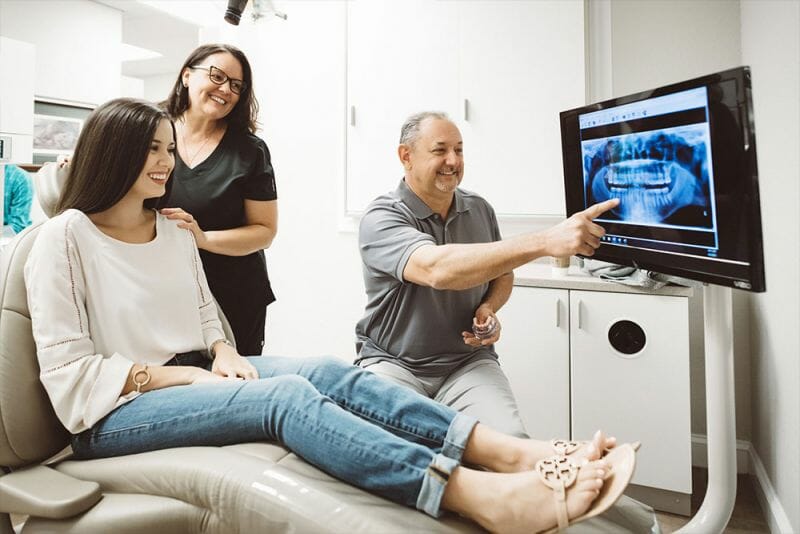Root Canals/Endodontics
 Sometimes referred to as endodontic therapy, a root canal is a restorative dental procedure that can help maintain your natural tooth while safely removing infection or decay. Today, root canals are standard practice in the dental office, and modern medicine and technology have made this a simple, safe, and comfortable process. If you are nervous, our team is happy to explain the benefits of sedation therapy and treatment.
Sometimes referred to as endodontic therapy, a root canal is a restorative dental procedure that can help maintain your natural tooth while safely removing infection or decay. Today, root canals are standard practice in the dental office, and modern medicine and technology have made this a simple, safe, and comfortable process. If you are nervous, our team is happy to explain the benefits of sedation therapy and treatment.
What Is a Root Canal?
The structure of a tooth is relatively straightforward, consisting of the hard crown portion that is visible above the gum line and a deep root structure that attaches the tooth to the jawbone. Because of the tooth’s uneven shape, bacteria and plaque can build up on the surface and will sometimes penetrate deep into the roots, causing an infection to form. When this happens, the entire tooth and other healthy teeth and gums in the mouth can become compromised.
A root canal is a particular therapy procedure that works to remove the infection. Dr. Crosby will make a small incision on the top of the tooth to gain access to the pulp in the root. Once the infection is cleared and the tooth has been sanitized, a crown will be placed over the infected tooth. This will help prevent future infection and will also give the tooth added strength and support.
How Do I Know If I Need a Root Canal?
Root canals are often used to help repair a decayed tooth. This procedure is an excellent alternative to extraction because it can retain most of the natural tooth.
Some common symptoms patients experience leading to a necessary root canal include:
- An abscess near the tooth
- Sensitivity to hot and cold
- Swollen or tender lymph nodes in the jaw below the infected tooth
- Tooth pain
- Gum pain or discoloration
Sometimes a root canal is used to treat an injured tooth. Dr. Crosby will thoroughly examine the injured or decayed tooth with X-rays and visual inspection before determining if a root canal is a suitable treatment for you.
Why Is a Root Canal Necessary?
Infected and decayed teeth can spell big problems for otherwise healthy teeth in the mouth. Infection can quickly spread to other teeth, to the gums, and even to the jawbone, if not properly removed and treated. Having a root canal is a great way to treat an infection or injury while still maintaining your natural tooth. A root canal is a milder alternative to extraction and allows you to keep your beautiful smile intact.
How Do I Care for My Root Canal?
Patients need to care for their new root canal to keep the tooth healthy. A secondary infection can occur in the same tooth, so proper oral hygiene is essential. Be sure to brush your teeth twice per day. Using toothpaste with added fluoride can help give the tooth even more strength. Because the root canal consists of a new dental crown, you must also take special precautions to protect the crown from chips and cracks. Avoid eating hard foods like nuts and ice that could break your crown.
Sometimes tooth decay, illness, or injury are beyond your control. Accidents happen, but luckily you have a professional and caring team at Crosby Dentistry in your corner. Contact our office to schedule a consultation where we can develop a treatment plan for your unique situation.
